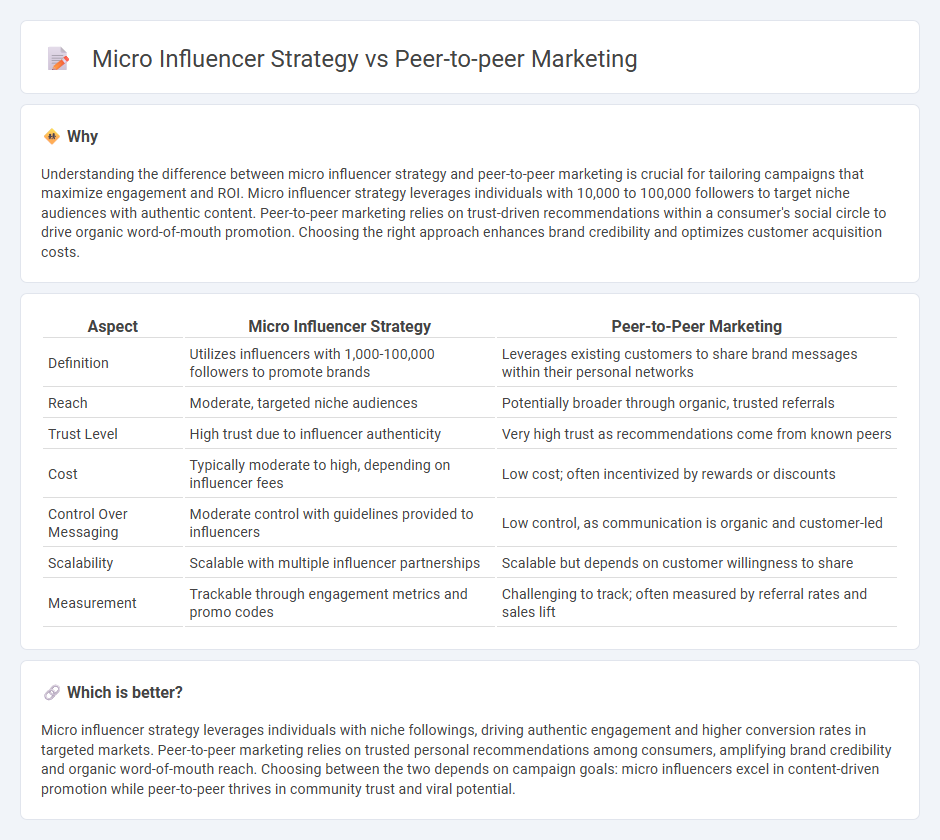
Micro influencer strategy leverages individuals with smaller yet highly engaged followings to create authentic brand connections, driving targeted consumer trust and higher conversion rates. Peer-to-peer marketing relies on existing customers sharing endorsements within their personal networks, harnessing word-of-mouth to amplify brand reach and credibility. Explore how combining these approaches can maximize marketing impact and ROI.
Why it is important
Understanding the difference between micro influencer strategy and peer-to-peer marketing is crucial for tailoring campaigns that maximize engagement and ROI. Micro influencer strategy leverages individuals with 10,000 to 100,000 followers to target niche audiences with authentic content. Peer-to-peer marketing relies on trust-driven recommendations within a consumer's social circle to drive organic word-of-mouth promotion. Choosing the right approach enhances brand credibility and optimizes customer acquisition costs.
Comparison Table
| Aspect | Micro Influencer Strategy | Peer-to-Peer Marketing |
|---|---|---|
| Definition | Utilizes influencers with 1,000-100,000 followers to promote brands | Leverages existing customers to share brand messages within their personal networks |
| Reach | Moderate, targeted niche audiences | Potentially broader through organic, trusted referrals |
| Trust Level | High trust due to influencer authenticity | Very high trust as recommendations come from known peers |
| Cost | Typically moderate to high, depending on influencer fees | Low cost; often incentivized by rewards or discounts |
| Control Over Messaging | Moderate control with guidelines provided to influencers | Low control, as communication is organic and customer-led |
| Scalability | Scalable with multiple influencer partnerships | Scalable but depends on customer willingness to share |
| Measurement | Trackable through engagement metrics and promo codes | Challenging to track; often measured by referral rates and sales lift |
Which is better?
Micro influencer strategy leverages individuals with niche followings, driving authentic engagement and higher conversion rates in targeted markets. Peer-to-peer marketing relies on trusted personal recommendations among consumers, amplifying brand credibility and organic word-of-mouth reach. Choosing between the two depends on campaign goals: micro influencers excel in content-driven promotion while peer-to-peer thrives in community trust and viral potential.
Connection
Micro influencer strategy leverages individuals with smaller but highly engaged followings to create authentic content that resonates deeply within niche communities. Peer-to-peer marketing amplifies this effect by encouraging these micro influencers' followers to share recommendations and experiences within their own social networks, enhancing trust and credibility. Both approaches harness the power of personal relationships and word-of-mouth to drive higher engagement and conversion rates in targeted marketing campaigns.
Key Terms
**Peer-to-Peer Marketing:**
Peer-to-peer marketing leverages personal networks to create authentic brand advocacy by encouraging customers to share their experiences directly with friends and family, resulting in high trust and engagement rates. This strategy emphasizes organic word-of-mouth promotion facilitated through social interactions, often supported by referral programs and user-generated content. Explore how peer-to-peer marketing can amplify your brand's reach and credibility by driving genuine consumer recommendations.
Word-of-Mouth
Peer-to-peer marketing leverages direct communication between consumers to facilitate authentic word-of-mouth promotion, while micro influencer strategy utilizes individuals with smaller, highly engaged audiences to drive targeted recommendations. Both approaches emphasize trust and credibility, yet peer-to-peer marketing often relies on organic interactions whereas micro influencer campaigns are more structured and measurable. Explore how combining these strategies can enhance your brand's word-of-mouth impact.
Authentic Advocacy
Peer-to-peer marketing leverages genuine customer recommendations to build trust and foster authentic advocacy through organic, word-of-mouth promotion. Micro-influencer strategies focus on niche influencers with smaller, highly engaged audiences, enhancing relatability and credibility in brand messaging. Explore how authentic advocacy drives deeper connections and higher conversion rates in both marketing approaches.
Source and External Links
Peer to Peer Marketing: The Fast and Easy Guide - This article explains peer-to-peer marketing as a form of word-of-mouth marketing where customers promote businesses to their peers, highlighting its power and strategy development.
What's P2P Marketing? An introduction to the Peer-to-Peer strategy - This introduction discusses the benefits of peer-to-peer marketing, emphasizing its authenticity and trustworthiness compared to other marketing forms.
Why Peer-to-Peer Marketing Works - This article highlights the authenticity of peer-to-peer marketing, showing how it leverages stakeholders as marketing channels to create genuine reviews and experiences.
 dowidth.com
dowidth.com